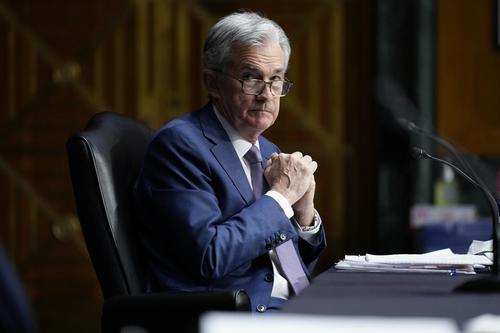El-Erian: Fed Should Start Tapering Now… But It Won’t
Authored by Mohamed Al-Erian, op-ed via Bloomberg.com,
I suspect that Federal Reserve officials are not the only ones looking for an uneventful policy meeting this week. The majority of market participants are also expecting an undramatic event that will include an upgrade of the economic outlook, a reiteration of uncertainties and the signaling of nothing new on policies. Unfortunately, it’s an outcome that kicks the policy can further down the road when the central bank should be thinking now about scaling back its extraordinary measures.
Although Fed officials raised their growth estimates significantly at their last meeting, they will most likely upgrade their economic outlook for 2021 again after the recent string of strong economic data. This will be accompanied by the usual Covid-related qualifications when accelerating vaccine deployment continues to race against growing infections and the threat of new variants of the virus.
The further improvement in the economic outlook is unlikely to change the Fed’s policy guidance, however.
Rather than follow the lead of the Bank of Canada, which last week began cutting back on bond purchases and signaled a quicker time frame for the next interest rate increase, the Fed will most likely take an approach similar to the one the European Central Bank conveyed last Thursday.
It will maintain policy as is, remind markets that it is willing to do even more should downside risks materialize and play down the risk of inflation and other overheating as transitory.
Markets have validated this policy attitude over the past month. After spiking to 1.76% in reaction to the improved economic outlook and inflation concerns, the yield on 10-year government bonds has declined, closing 20 basis points lower last week. Despite some small wobbles, risk-taking in the equity markets has remained robust. And all this has come in the context of reassuring statements from top Fed officials – not just playing down the significance of the coming increase in inflation but also indicating that there is no need to worry about risks to financial stability.
Such a policy approach does have the attractiveness of repressing financial volatility at a time of economic, policy and institutional transitions. The Fed does not want to be a source of financial instability, especially when President Joe Biden’s administration faces challenges in Congress on its infrastructure proposal, the economy is picking up steam and the long-overdue handoff away from excessive reliance on monetary policy is materializing.
It is also an approach that papers over the growing inconsistency between ultra-loose financial conditions on the one hand and a strongly recovering economy, rising inflationary pressures and yet more evidence of pockets of excessive and, at times, irresponsible risk-taking on the other.
The attractiveness of short-term calm comes at the risk of more significant policy challenges down the road.
Rather than do what it is most likely to do this week — that is, accompany the ECB in stoking ultra-loose financial conditions even though the U.S. economic outlook is brighter than Europe’s — the Fed should seriously consider following the Bank of Canada’s example by initiating a gradual and careful retreat. The longer it takes to do so, the harder it will be to pull off an eventual normalization without risking both significant market volatility and damaging what should and must be a durable and inclusive economic recovery.
Tyler Durden
Mon, 04/26/2021 – 12:00
via ZeroHedge News https://ift.tt/3dXpxr3 Tyler Durden
